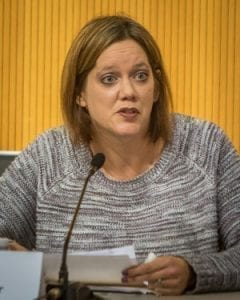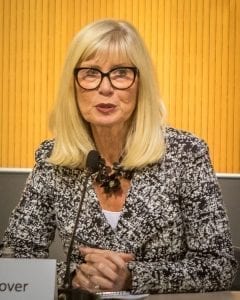Vancouver City Council candidates present positions at candidate forum
VANCOUVER — Vancouver City Council Position 3 is one of the contested seats in the upcoming Nov. 7 general election. The seat is currently held by Anne McEnerny-Ogle, who is not seeking re-election to the seat.
McEnerny-Ogle is instead running for the position of mayor of Vancouver. The two candidates for council position 3 are Linda Glover and Michelle Beardshear.
Glover began her career as an elementary school teacher and principal. Upon moving to Vancouver, she became involved in local nonprofits, including serving as executive director of the nonprofit Divine Consign. She also said that she has been involved with many local business and development associations and groups.

Beardshear is an employee of Clark Public Utilities and serves as the chair of the East Mill Plain Neighborhood Association. She said that as a resident of east Vancouver, if elected she would bring a voice to the city council that did not only represent the downtown area.
Both candidates had an opportunity to outline their plans if elected at a general election candidate forum hosted by the League of Women Voters of Clark County on Oct. 12.
The candidates were asked a series of questions by moderator Nancy Barnes, and each had a chance to answer in turn.
The candidates were first asked how they thought the city should develop the Town Plaza property on Mill Plain, which Vancouver is currently in the process of purchasing.
“I’m very excited about this purchase by the city,” Glover said.
She said that she wants the area to be developed in a way that provides more services to more people. This includes facilitating walkability and livability. Glover said that the property should be developed in a way that provided services and living spaces that allow for walking between the two, as well as easy access to transportation lines.
Beardshear said that the property should be developed to provide shops or retail services in central Vancouver. This would help spread development around the city, she said. Beardshear also said that the city should look to develop some housing on the property, and noted that some of it should be allocated for low income or “inclusionary housing.”
Glover and Beardshear were next asked how Vancouver’s public transportation could be improved, both locally and to Portland.
According to Glover, the city needs to look to the future to plan for transportation and community needs.
“It’s a delicate balance,” Glover said. “We have to improve ridership to be able to improve services.”

Glover said that Vancouver needs a more complex public transit system, with more lines branching into neighborhoods, as well as main corridors.
Beardshear said that “public transportation is key and it needs to be kept.” However, the current system faces difficulties with excessive travel times from place to place. Addressing travel times on public transit needs to be a priority, Beardshear said.
Currently, there is a program under development that would allow busses to drive along the shoulder of Highway 14 that could potentially reduce travel time, Beardshear said. She also noted that C-Tran’s Vine service needs to expand to Mill Plain, and that costs on mass transit need to be kept down to help accommodate fixed incomes.
Vancouver instituted a new voter approved tax for developing affordable housing. Both candidates were asked their opinion of the tax.
Glover said that she was pleased with the strong voter support for the measure. She also said that she wants to make sure citizens’ input is listened to, and that funds are being utilized as promised. According to Glover, the city should incentivize builders and developers to ensure a certain amount of development be earmarked for low income housing.
“It was a well written plan,” Glover said. “Now it’s my responsibility if I’m elected to city council to put that plan into place.”
Beardshear said that the city should use the revenue from the tax to build a new emergency shelter for the homeless. She also said that the city should look to work with developers that are experts in affordable housing, and that Vancouver guarantee that some amount of housing is designated for low income earners.
“I think it’s amazing that our citizens voted this in,” Beardshear said. “I think it’s amazing that our city council allowed the citizens to vote this in and didn’t just put it in place.”
In a 2011 Climate Action Plan, the city of Vancouver stated that it should wait on the federal government to act before embarking on climate initiatives. Glover and Beardshear were asked if they believed Vancouver should take action on climate issues and what actions they would recommend.
“I definitely don’t think we can wait, and I definitely think that Vancouver should be a leader,” Glover said. If elected, Glover said that she would want to act immediately to help preserve the local environment in Vancouver. Her main focus would be to protect the quality of water resources and the quality of air in Vancouver.
Beardshear said that Vancouver currently has a moratorium on building facilities that are small enough that they do not fall under the state’s Energy Facility Site Evaluation Council process, which evaluates and licenses energy facilities in Washington. Beardshear said that the city needs to keep that moratorium in place.
She also said that more people need to be educated about local environmental resources.
“I think that Vancouver should step up,” Beardshear said, and provide an example for other cities to follow.
In a final question, Glover and Beardshear were asked what infrastructure improvements were most needed in Vancouver and how those improvements could be implemented.
Beardshear said that traffic is a top priority among Vancouver’s infrastructure issues. “Traffic is forever going to be a problem in Vancouver,” she said.
To help address this issue, Beardshear said that the city should look to improve its east-west corridors. She also said that the city must work with the state and secure all grants possible to address traffic in the city.
Beardshear also said that the city’s education system is also an infrastructure issue. According to Beardshear, the city needs to invest more money in its school districts as an investment in its future.
Glover said that the primary infrastructure issue in Vancouver is transportation and that the city needs to make it easier for residents to get to goods and services. She said that Vancouver should plan for the future to provide easier movement across a range of transportation options.
As housing prices increase in the central parts of Vancouver, Glover said, people will move farther away from the core. Residents will need to have more transportation options to get to jobs, and that transportation needs to be easily accessible and affordable, Glover said.




